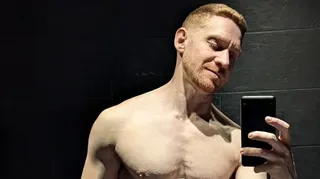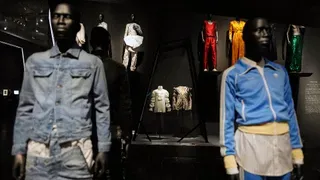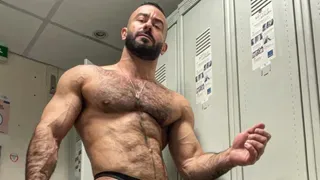November 21, 2023
Queer Opera: Tobias Picker & Aryeh Lev Stollman Talk 'Awakenings' Recording and 'Lili Elbe' Premiere
Kilian Melloy READ TIME: 10 MIN.
When EDGE last spoke with composer Tobias Picker and his husband, the novelist, neuroradiologist, and librettist Dr. Aryeh Lev Stollman, the duo were preparing for the one-night only Boston premiere of their operatic adaptation of "Awakenings," the sensational true story of how gay neurologist Dr. Oliver Sacks brought patients back from a state of seeming catatonia with the use of L-dopa at Beth Abrahams Hospital in New York. The book – a collection of cast studies – had already been adapted as a feature film with Robin Williams, as well as inspiring a ballet, the music for which Picker composed.
Now there's a recording – on CD and streaming music services – of the opera version of "Awakenings," featuring the cast and conductor of the Boston performance, produced by Picker and conductor Gil Rose.
When EDGE caught up with the couple to talk about the new CD they were in Switzerland, preparing for the world premiere of their latest opera, "Lili Elbe," based on the transgender pioneer of the same name – a woman who was one of the first to undergo gender affirmation surgery. The opera premiered Oct. 22 at the Theater St Gallen in the Swiss city of St Gallen, under conductor Modestas Pitrenas and stage director Krystian Lada, and starred Lucia Lucas as Elbe.
Picker and Stollman told EDGE all about the new CD, as well as "Lili Elbe," which – for various reasons – Picker declared to be "probably the queerest opera ever written."
EDGE: There's now a CD of "Awakenings" by the Boston Modern Orchestra Project and Odyssey Opera Chorus that you co-produced, Tobias, along with Gil Rose. The recording sounds terrific! Were the words or music revised at all from the production?
Tobias Picker: We went into the recording studio the next day, and I don't recall making any changes after the performance. I don't remember if we changed anything in rehearsals, but I don't think so. If we did, it would have been minor adjustments.
Aryeh Lev Stollman: We also had a great sound engineer, Antonio Oliart. He has many Grammys. I believe he is one of the best, and that's why it sounds so good. Also, Gil Rose really knows how to make a recording. He sat for endless hours with Antonio, getting it just right.
EDGE: Were you experts in the engineering process, or was this something you were learning about?
Tobias Picker: I've been recording since 1980. Now we're digital, but in those days it was actually tape, and the first time I sat with the producer and engineered my first record, he had a little box that he put the tape in, and a razor blade. He would play it on the tape recorder, find the spot we wanted to splice, take the razor blade and splice it, and then put the outtakes around his neck – and, sometimes, the tapes we were going to use. He had lots of [pieces of] tape around his neck, and I had no idea how he could tell which was which. It was very nerve wracking, but also very memorable.
EDGE: There's now a CD of "Awakenings" by the Boston Modern Orchestra Project and Odyssey Opera Chorus that you co-produced, Tobias, along with Gil Rose. The recording sounds terrific! Were the words or music revised at all from the production?
Tobias Picker: We went into the recording studio the next day, and I don't recall making any changes after the performance. I don't remember if we changed anything in rehearsals, but I don't think so. If we did, it would have been minor adjustments.
Aryeh Lev Stollman: We also had a great sound engineer, Antonio Oliart. He has many Grammys. I believe he is one of the best, and that's why it sounds so good. Also, Gil Rose really knows how to make a recording. He sat for endless hours with Antonio, getting it just right.
EDGE: Were you experts in the engineering process, or was this something you were learning about?
Tobias Picker: I've been recording since 1980. Now we're digital, but in those days it was actually tape, and the first time I sat with the producer and engineered my first record, he had a little box that he put the tape in, and a razor blade. He would play it on the tape recorder, find the spot we wanted to splice, take the razor blade and splice it, and then put the outtakes around his neck – and, sometimes, the tapes we were going to use. He had lots of [pieces of] tape around his neck, and I had no idea how he could tell which was which. It was very nerve wracking, but also very memorable.
EDGE: Tobias, you also composed the music for the ballet version of "Awakenings." Did you revisit any of the themes from that earlier work, or are the two unrelated musically?
Tobias Picker: There's nothing in the ballet that I was able to use in the opera. I tried to recycle some, but nothing worked. It was a completely different kind of storytelling between choreography that's abstract, and opera, which is narrative. There was no libretto for the ballet. It was a modern dance ballet, so it basically told the story told through movement.
Once I had Aryeh's libretto [for the opera] I had a very different and specific take on the material and the direction that I needed to go in. The ballet was only 30 minutes, but the opera is a whole evening, almost two hours. I think you can recognize the composer in both, but it's there's no themes or harmonies or anything that's from the ballet.
EDGE: Aryeh, it's interesting to hear Tobias say that when he had your libretto to work with, that changed his approach to the music. Did your familiarity with his music give you a starting point as you began to adapt the book into the libretto?
Aryeh Lev Stollman: I've lived with Tobias' music for 43 years, so it's in me. I would write a scene, then he would write the music, and I would write next scene. We worked very closely, in a way different than he used to compose his operas. We would go back and forth if he needed a change in the words to provide for the music that he wanted to write. So, the music influenced the words, the words influenced the music; the boundaries were a little overlapping.
EDGE: Having an idea of Tobias' music were you saying, "The cadences of the words are going to have to be a certain way to fit what's likely to be the cadence that this is going to take?"
Aryeh Lev Stollman: If so, I would say it's subconscious, or unconscious. It's a different kind of writing than in my novels, because it's more concise. You have to get to the point of what you're saying, whereas in a novel you have time to ruminate over things. You don't have that in a libretto.
EDGE: The two of you are in Switzerland preparing for the world premiere of "Lili Elbe." Is it a similar process to "Awakenings?"
Tobias Picker: For this opera, we had a dramaturge. Lucia Lucas, who it's written for and is starring as Lili Elbe, is our dramaturg and our expert on all matters having to do with the transgender experience. Since we're writing about a transgender woman – one of the first transgender women to have gender affirmation surgery – it was imperative to work with an articulate advocate and spokesperson for the trans community, who is also one of the most important opera singers working today. Actually, I would turn those two things around: She is one of the most important opera singers today, and she happens to be trans.
EDGE: I remember how thrilled you were with the cast of "Awakenings," and it sounds like you've got the same enthusiasm for the quality of the performance in "Lili Elbe."
Tobias Picker: The cast is fantastic, and the orchestra is terrific. The casting is quite different, because it's so dramatically diverse. Lili Elbe's brother Marius is played by a trans woman, Sam Taskinen, who is a great Finnish bass baritone, who also covers the role of Lili; and Anna, Mother Wegener, and the Young Woman, as well as Orpheus, are played by Mack Wolz, [who is] non-binary. The cast is as diverse as it gets.
Aryeh Lev Stollman: And we have a great director, too – Krystian Lada, who has a wonderful imagination.
Tobias Picker:It's probably the queerest opera ever written.
EDGE: I am not an expert, but I don't know that there have been a lot of queer operas.
Tobias Picker: There have been a few lately, but this one has got a queer librettist, composer, and director; the intendant of the theater, Jan Henric Bogen; and a large part of the cast. And the subject matter is [also queer].
This production also is very unusual because it's so interdisciplinary. Of course, it has a chorus, but the theater has a corps du ballet which is really top notch. The head of the ballet choreographed a great deal of the opera; his name is Frank Fannar Pedersen. We have 17 dancers in this opera, and five of them suspended from the ceiling. You would never see that in America. Maybe on Broadway, but certainly not in any opera house in America today. Even in Europe, quite a few [opera companies] do have ballet companies in associated with them, but they not necessarily as integrated with the other art forms as this one is.
EDGE: This is your second opera working together as composer and librettist. Do you have others that you are planning for the future that you'd like to collaborate on? And if so, are they also queer-themed?
Tobias Picker: You want to talk about the next one? How much do we want to say about it?
Aryeh Lev Stollman: We are both Jewish, and there are Jewish issues we want to bring out in the next opera. There's been a rise in antisemitism throughout the world and in America, and we want to address that as proud Jews and gays. That has to be addressed, and that should be a subject, as well, of an opera. We're still developing it, so that would be a nice [topic for] another conversation.
For more information about Tobias Picker and how to buy or stream "Awakenings," visit his website.
Kilian Melloy serves as EDGE Media Network's Associate Arts Editor and Staff Contributor. His professional memberships include the National Lesbian & Gay Journalists Association, the Boston Online Film Critics Association, The Gay and Lesbian Entertainment Critics Association, and the Boston Theater Critics Association's Elliot Norton Awards Committee.







